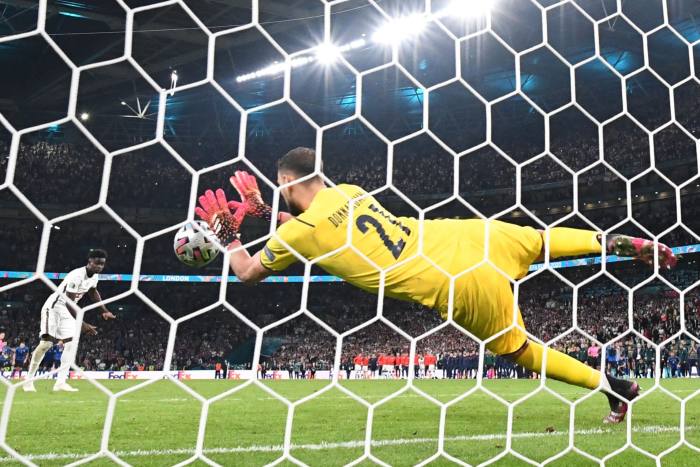How to emerge a hero from the tension of a World Cup penalty shootout
How to take a penalty, and how to save one? With the World Cup’s knockout stages starting on Saturday, these questions could decide who wins the trophy. At the 2018 tournament, four games in the knockout rounds were tied after 120 minutes and won on penalty shoot-outs. This time, some teams have prepared better than ever. Others have not.
The first thing to know is how your opponents shoot. Broadly, every kicker has to answer one question: do you wait until the keeper moves? Croatia’s Luka Modrić does. He runs up slowly, head raised, watching the keeper for the slightest indication — even a lifted heel — of which way he’ll move. At that cue, Modrić taps the ball the other way. He has converted 21 of his 24 career penalties, or 88 per cent, according to Transfermarkt. The football-wide conversion rate has dropped over the past decade from 82 per cent to about 75 per cent, probably because data analysis helps teams decrypt opposing kickers.
A keeper facing Modrić — or Poland’s Robert Lewandowski — will want to stay immobile as long as possible. That worked for Uruguay’s Sergio Rochet against Ghana on Friday: unfooled by André Ayew’s slow approach, he chose the right corner, helping send Uruguay through to the knockouts at the Ghanaians’ expense.
England’s chief penalty-taker Harry Kane requires a different method, because he doesn’t watch the keeper. His former club coach José Mourinho once said: “Harry decides . . . a few days before the game how he is going to take it and then spends three or four days before the game practising that shot and I just love that.” Kane varies the direction of his penalties well, so a keeper must pick a side more or less randomly, and dive instantly. Good luck: Kane’s conversion rate is 85 per cent.
Lesser kickers sometimes waver between Kane’s strategy and Modrić’s. One example is France’s Antoine Griezmann, who has missed five of his last seven spot-kicks.

Argentina’s Lionel Messi also has a flaw in his approach that will be apparent to analysts who study sequences rather than merely counting how many penalties are placed in which corner: he seldom repeats his last kick. Last week Messi scored to the Saudi keeper’s right, then hit a well-struck shot to the left of Poland’s Wojciech Szczęsny, who saved. The world’s best footballer has a distinctly average career penalty conversion rate of 77 per cent, according to Transfermarkt. His rival, Portugal’s Cristiano “Penaldo” Ronaldo, is six percentage points better.
But these are specialists, and in shoot-outs a team must choose five kickers. Players who never normally take penalties suddenly find themselves making the long, lonely walk to take the kick of a lifetime. Under extreme stress, few dare wait ice-cold for the keeper’s move. Instead, inexperienced kickers tend to hit the simplest penalty: a drive to their “natural side”, which for a right-footed kicker means right of the keeper. The historical conversion rate in World Cup shoot-outs is only 70.3 per cent, calculates data provider Opta.
The Dutch have nominated one of their three keepers as their designated “penalty killer”, but won’t reveal who it is. If it isn’t starter Andries Noppert, coach Louis van Gaal might bring on the specialist just before the shootout, as he did with Tim Krul at the World Cup in 2014 against Costa Rica. Krul stood towering over each opposing kicker, trash-talking him, and the Dutch won.
That was a case of a keeper’s aura intimidating opponents. One beneficiary from that in Qatar might be Switzerland’s Yann Sommer, who has graduated from average penalty-stopper to penalty-killer: since September 2019 he has saved five of the 11 he faced in all competitions.
England have suffered more penalty anguish than perhaps any country except Spain. When Gareth Southgate became their manager in 2016, they had lost five straight shoot-outs. Southgate — who himself missed England’s decisive kick in the Euro 1996 semi-final against Germany — has tried to recreate the full ambience of shoot-outs in training sessions. His men have also been taught a key statistic, writes Paul Hayward in England Football: The Biography. “Players who take a slow run-up score 80 per cent of the time, while those who run in faster convert only 60 per cent.”
Southgate has removed some responsibility from his players by choosing England’s kickers himself. That banishes the spectacle of a manager begging exhausted, stressed players to have a go, as Spain’s coach Fernando Hierro did against Russia in 2018. Forward Diego Costa was caught by TV cameras warning not to choose Koke. Hierro insisted: “Koke is good.” After the midfielder missed and Russia won, Costa growled, “I told you.”
Managerial choice also stops incompetent penalty-takers, such as England’s Raheem Sterling, from counterproductively volunteering themselves. Southgate’s team did beat Colombia on penalties at the last World Cup. But homework cannot guarantee success: England lost the final of Euro 2020 on penalties, perhaps awed by the size and shot-stopping brilliance of Italy’s 6ft 5in goalkeeper Gianluigi Donnarumma.
Luck matters in shoot-outs. But to paraphrase the golfer Arnold Palmer, the more teams prepare, the luckier they tend to get.
For all the latest Business News Click Here
For the latest news and updates, follow us on Google News.
